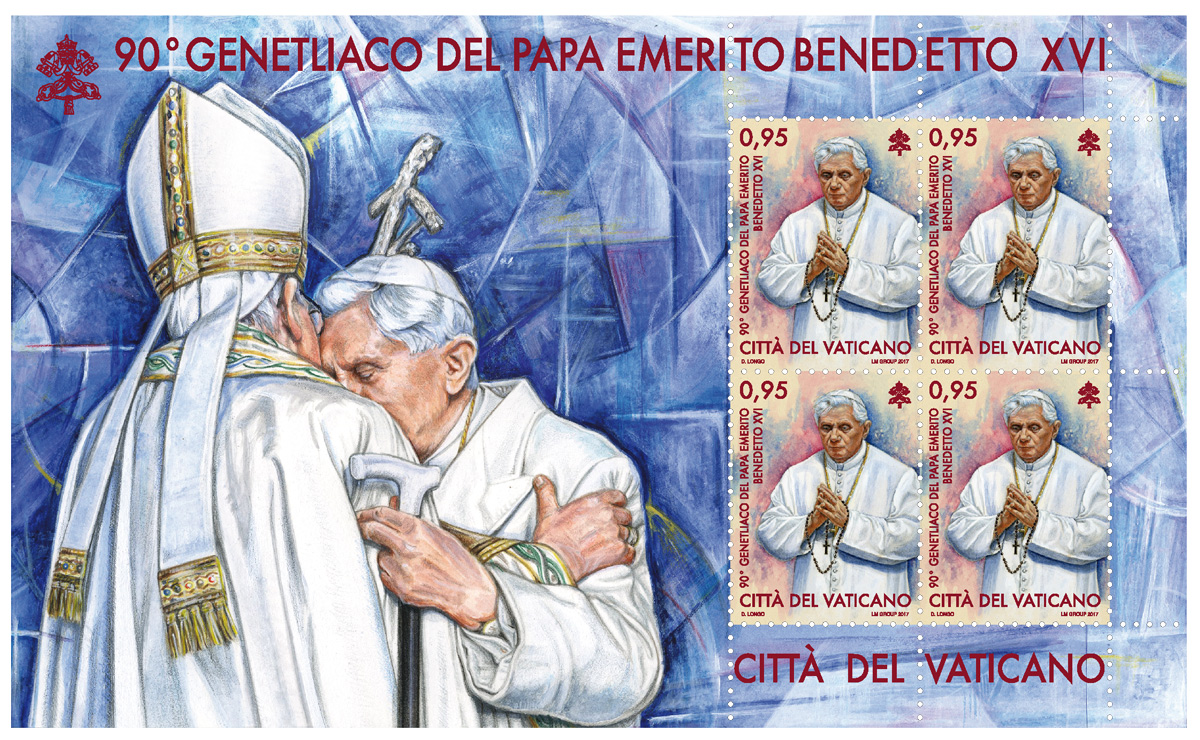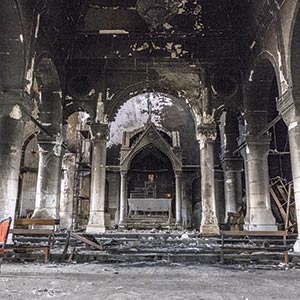Christians march in Iraq
A peace march from Ankawa, the Chaldean quarter of Erbil in northern Iraq, to Qaraqosh, near Mosul, urged an end to all forms of violence and called for the gift of peace. Starting in an area heavily populated by Christian refugees from the Mosul area, the 86-mile walk ended on Palm Sunday in Qaraqosh, a town liberated from Islamic State last October after two years of occupation.
Hundreds attended the Palm Sunday Mass, celebrated by the Syrian Catholic Archbishop of Mosul, Yohanna Petros Mouche, in the town’s burnt-out Church of the Immaculate Conception, (pictured last October), which the army guarded.
Qaraqosh, with an overwhelmingly Christian population of around 50,000 before the jihadists occupied it in August 2014, was the largest Christian town in the country. Iraqi forces retook it late last year but it remains almost completely deserted as security concerns remain.
A Czech bishop has demanded political asylum for a group of Chinese Christians who have been in detention for a year pending a final ruling on their case. “It’s … as if economic interests are more important than human rights,” said Bishop Vaclav Maly, chairman of the Church’s Justice and Peace Commission. “A positive consideration of their asylum requests would improve the Czechs’ reputation in the international arena. It would show we decide about our own affairs and don’t allow ourselves to be held in contempt.” More than 60 Chinese Christians from various denominations requested asylum in 2016, citing hardship and persecution. They are being held under tight security at two separate Czech reception centres. Czech media suggested that President Milos Zeman feared a formal grant of asylum could damage the country’s ties with China.
President Ellen Johnson Sirleaf of Liberia (above) has told a high-level delegation of the Catholic Bishops of the Regional Episcopal Conference of West Africa that she welcomes a “strong partnership” between the Church and the Government. The delegation she received at her office in Monrovia on 4 April included Archbishop Ignatius Kaigama of Jos, in Nigeria, President of the conference. He thanked President Sirleaf for her support to the African Faith Leaders Initiative on the post-2015 development agenda, focusing on the UN Sustainable Development Goals and expressed the bishops’ concerns about religious extremism.
Long wait for ruling on shrine
The Prefect of the Congregation for the Doctrine of the Faith has warned that it could “take a long time” for the Vatican to rule on the alleged Marian apparitions at Medjugorje in Bosnia and Herzegovina. “The position will need to be nuanced even if the Mother of God’s appearances are recognised, as with Lourdes and Fatima,” Cardinal Gerhard Müller told Poland’s Catholic Information Agency (KAI) last Sunday. He was speaking as Pope Francis’ delegate, Polish Archbishop Henryk Hoser, continued his visitation to the area to acquire a “deeper knowledge of the pastoral situation”. Cardinal Müller said the CDF was studying the 42,000 claimed appearances of the Virgin Mary since 1981, with a view to a papal ruling, but said that Catholics could still “face a long wait” for an official Church pronouncement.
A Catholic bishop from eastern Ukraine has urged Europe not to “abandon” his country, as pro-Russia separatists press on with a bid to engineer its “gradual collapse”. “No solution is in sight to this conflict, since the separatists are constantly getting Russian weapons, war technology and soldiers. Our incomparably stronger neighbour to the east is pursuing an exhaustive tactic aimed at Ukraine’s gradual collapse,” said Bishop Stanislav Szyrokoradiuk of Kharkiv-Zaporizhia in an interview with Austria’s Kathpress agency.
Christian leaders in Pakistan have questioned a government decision to construct a wall along the 1,500-mile border with Afghanistan. The colonial-era “Durand Line” is largely unpatrolled. Pakistan argues that it will improve security in the context of regular clashes between the Pakistani army and Taliban militants. But the Anglican bishop of Peshawar, Earnest Jacob, said that “the fence can decrease bombings, not extremism”. Ata-ur-Rehman Saman, of the Catholic bishops’ Commission for Justice and Peace, said the Taliban “do not use official boundaries”.
Vote rigging claims as left wins
Socialist Lenin Moreno (above) has been declared the winner of Ecuador’s closely contested presidential election on 2 April. He will succeed his ally, the outgoing President, Rafael Correa. The right-wing challenger, Guillermo Lasso, has alleged that the vote was rigged and protests have broken out against the results. Mr Moreno won 51.16 per cent of the vote, compared to Mr Lasso’s 48.8 per cent. The bishops’ conference, in a statement on 5 April, said that the people have a right to the truth, and that the electoral authorities and the national Government “have a duty to ensure transparency and show evidence of the truth regarding the results”.
On Saturday 8 April it was announced that the long-awaited disarmament by the Basque separatist group ETA had taken place. ETA declared the exact position – in the Basque area of southern France – of eight storage places containing 120 firearms and 3,000 kilograms of explosives. ETA killed more than 800 people over 40 years in a violent campaign for an independent Basque state in south-west France and northern Spain. The hope now is that peace will remain with the help of the Church and other negotiating bodies. In Bayonne, rallies were held to celebrate the disarmament but also to campaign for a truly independent Basque country.
13 April 2017, The Tablet
News Briefing: global
 Loading ...
Loading ...
Get Instant Access
Subscribe to The Tablet for just £7.99
Subscribe today to take advantage of our introductory offers and enjoy 30 days' access for just £7.99



